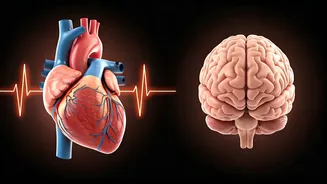Heart-Brain Connection Unveiled
Recent studies have brought into sharp focus the strong link between heart health and cognitive function, especially regarding the risk of developing dementia.
Research indicates that individuals with poor cardiovascular health in their middle years face an elevated likelihood of cognitive decline later in life. This observation underscores the importance of maintaining a healthy heart as a preventive measure for brain health. It is not merely a coincidence that these two crucial organs are connected; they function together via a network of blood vessels. Efficient blood flow, ensured by a healthy heart, is vital to supply the brain with essential oxygen and nutrients, which in turn support its optimal function. When the heart struggles, this blood supply diminishes, paving the way for cognitive impairment.
Key Research Findings
The research emphasizes specific biological markers, such as high levels of troponin, that indicate potential problems. Elevated troponin levels, typically associated with heart damage, have also been associated with an increased risk of dementia. This discovery suggests that subclinical heart damage, even before obvious symptoms occur, may affect the brain's health. The study supports the idea that the health of your heart directly affects the condition of your brain. The investigation highlighted that addressing heart health issues may also serve as a method of reducing the likelihood of dementia and protecting your cognitive health. This demonstrates that safeguarding your heart might be one of the best ways to promote your brain health and stave off cognitive decline as you age. It underscores the importance of regular health check-ups and early intervention.
Lifestyle Factor Impacts
Multiple lifestyle choices contribute significantly to maintaining both heart and brain health. Cardiovascular experts commonly identify several important lifestyle factors affecting heart health. These elements include regular physical activity, a nutritious diet low in saturated fats and processed foods, and the effective management of stress. Consistent physical activity enhances blood flow, promotes the delivery of nutrients to the brain, and lowers the risk of conditions like hypertension and diabetes, which may negatively influence cognitive health. Eating a diet rich in fruits, vegetables, and whole grains further supports brain function by giving essential vitamins and antioxidants. Equally important is managing stress. Chronic stress elevates blood pressure, which can damage the arteries and disrupt blood flow to the brain, hence increasing the risk of cognitive deterioration.
Preventive Strategies
Preventing cognitive decline and protecting brain health involves adopting proactive measures. Regular medical check-ups that include heart health assessments are critical to detect early signs of cardiovascular issues. Paying attention to any symptoms, such as chest discomfort or shortness of breath, can lead to early diagnosis and effective treatment. Moreover, integrating stress management strategies like meditation, yoga, or spending time in nature can significantly enhance mental well-being and brain health. A balanced lifestyle that includes enough sleep, regular exercise, and a healthy diet can support cognitive health, safeguarding against age-related cognitive decline. Moreover, taking part in mentally stimulating activities, such as puzzles or learning new skills, can promote brain health and strengthen neural connections, improving long-term cognitive function.
The Long-Term Outlook
As research continues to reveal the intricate connections between heart and brain health, there is growing optimism about the potential to reduce the risk of dementia. By focusing on preventive measures and early intervention, individuals can significantly improve their cognitive health into old age. The integration of healthy lifestyle choices with regular medical check-ups forms a powerful approach to preserving both heart and brain function. This integrated approach not only improves quality of life but also empowers individuals to take control of their health, promoting healthy aging. The future of cognitive health involves a holistic strategy, emphasizing the interconnectedness of physical and mental health to encourage both longevity and cognitive vitality.




















